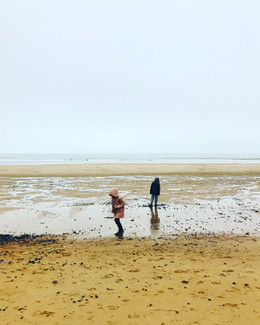Less Ego, More Shared Moments
- teodoratakacs
- Dec 31, 2021
- 10 min read
Updated: Jan 2, 2024

A few years ago, I read a story that changed my perspective on death and helped me put my long-lived anxiety at the thought that I might die young, without accomplishing anything meaningful, in a new light. It was the story of a man who at age 53, found out that he had a rare form of brain cancer, glioblastoma multiforme, and was given three more months to live. He had a wife and two daughters and was the CEO of a large corporation. Being someone extremely organised, he had detailed plans for his family and the last thing he had expected was his life to end so early. But that same planning instinct kicked in when all that was left were three months to live. One evening at the dinner table, he drew five concentric circles, representing the map of his relationships. In the center was his family and in the outer circle more distant acquaintances. He decided that how he wanted to spend the last months of his life, was by creating memorable moments with the people surrounding him.
He first started by reaching out to the people from the outer circle. He called or emailed his acquaintances, sharing good memories and sending words of appreciation. Then we moved to the fourth and third circle where his friends were. He went for a lunch or took a long walk in the park, remembering meaningful experiences they shared. As he moved to the second circle, he said goodbye to his close friends and sisters and he left the final weeks to be spent undisturbed, with his wife and daughters. They went to a remote location in the middle of nature, went on short walks and boat trips as his health was deteriorating, but spent all the time together, sharing more meaningful moments than they had in the years before. As he wrote a few days before he died:
“I experienced more perfect moments and perfect days in two weeks than I had in the last five years, or than I probably would have in the next five years, had my life continued the way it was going before my diagnosis. Look at your own calendar. Do you see perfect days ahead or could they be hidden, and you have to find a way to unlock them? If I told you to aim to create 30 perfect days, could you? How long would it take? 30 days? Six months? 10 years? Never? I felt like I was living a week in a day, a month in a week, a year in a month.”
The man was Eugene O’Kelly, former CEO of KPMG and author of Chasing Daylight and I read this story in The Power of Moments, by Chip and Dan Heath. The reason why it stuck with me was because it made me think about moments in a totally new way. Being someone who struggled all her life to overcome perfectionism, I tend to stay away from the term “perfect moments”. But what I started to think about more and more, was how can I intentionally create memorable moments and not just wait for them to happen serendipitously? How can we live a life full of meaningful moments every day, and not just in the last months before we die? We all have a limited number of hours available in a day and if we don’t spend time to purposefully plan them, we end up living a life designed by someone else, feeling like passengers racing through empty train stations. If you ever watched Soul, you probably remember the disoriented creatures mumbling in the dark dessert, looking for something that wasn’t there. The “lost souls”. I don’t want to become a lost soul who only remembers about the importance of moments, relationships, generosity, and connection in December, just because it’s Christmas, while the other eleven months I’ve been absorbed with work, personal achievement, continuous running without a purpose and an overwhelming feeling that I should always do more.
******
Our consumer driven society, fuelled by mesmerising commercials that project an ideal image of happiness, got us to see December like this fairy tale period of the year when people gather, share wonderful moments together, eat good food and enjoy amazing gifts. It is true that sharing these moments with loved ones brings us more positive emotions of love and happiness.
But it’s also true that December is the most stressful time of the year. As we want to have everything perfect, we push ourselves too much, trying to squeeze all that joy and happiness in a few days.
What if we spread these moments throughout the whole year, and like Eugene O’Kelly, we focus on the inner circle during that short week of the Holiday season? What if we could design a “memorable moments” plan that would focus on nurturing the meaningful relations in our life, every day and week of the year?
When we think about certain experiences in hindsight, it’s sometimes hard to find good arguments to convince us to repeat it. I remember the weekend I spent with my family at Euro Disney in Paris. Super crowded, long waiting lines, bad food and everything ridiculously expensive. And still, it was one of the best experiences we can remember as a family. Why? Because our minds are irrational and our memories selective. We only remember snippets, scenes, moments that gave us strong emotions. Daniel Kahneman has extensively researched the topic of duration neglect and demonstrated how people cannot remember how long an experience is. If you feel acute pain for twelve hours in a row, you will only remember the pain but not how long it took.
We tend to remember the peaks and the ends of our experiences (the peak-end rule), therefore the experience doesn’t equal the memory of that experience (experiencing self vs remembering self). When we think about experiences and moments, we have three stages: anticipation, experience, and memory. Unfortunately, many times, we spend more time anticipating and always thinking about the next thing, while we lose sight of the experience itself and being present with all our senses.
A few years ago, I walked with my grandmother to the cemetery, to lay fresh flowers on the grave of my grandfather. It was a warm summer day, late afternoon, and the sunlight was falling peacefully on the graves, through the leaves of the trees surrounding them. It was a serene scene, and I was watching my grandma walking three steps in front of me, swinging her hips and looking up with her characteristic proud and peaceful smile of her face. As I was living that moment, I took a mental shot of that image and I promised myself I would never forget it. After so many years, I can still take that snapshot from a drawer of my memory and feel that moment like it was yesterday. I’m sure the image lost some of its intensity and accuracy. Were those trees chestnut or maple trees? Was the smell of the chrysanths as strong as I like to remember it? But one thing that I will for sure remember is my grandma’s walk, her serene face, and the colourful floral pattern shirt that she was wearing.
“Many moments that we live are mostly forgettable and occasionally remarkable”. But we can intentionally build more remarkable moments every day if we understand what makes a such moment in the first place.
Moments of Elevation
If we are not mindful, we risk living our days following a script and a routine that will create very few memorable moments. Adding elevation to our experiences means that we can intentionally create peak moments during our days and weeks: celebrating a small win at work, recognising someone when they least expect it, choosing to do a fun activity with your families after dinner, surprising a friend with a symbolic gift or a few thoughtful words, without any special occasion. The reason why these small moments make such a big difference and get remembered is that they boost our senses and break the script. They rise above the routine. They bring us energy, motivation, and joy. It’s hard to forget the first kiss, the first day of school, the graduation ceremony, the first job, when these were such exceptional experiences in a row of forgettable, routine experiences. But we can actively create more moments like these if we spend time focusing on creating peaks and adding a sprinkle of unexpectedness.
Can you think about a moment or experience that was out of ordinary and made you feel special? What was exceptional about this moment?
Moments of Insight
Can you still remember one aha moment that completely changed your view on something? Or gave a completely new twist to the course of your life? These moments are difficult to intentionally design because it’s their serendipitous nature that makes them special. We can try to design trip over the truth experiences for others, by showing a new perspective and hoping they might see the situation from a different light, but it’s a long shot and in my opinion, very difficult to achieve. On the contrary, what we can easily do to have more moments of insight, is reflect on what happens in our lives and to the people around us. Can we learn something from what happens during the day? Absolutely. When we just run from one thing to another and we don’t stop and think for a few minutes, we risk missing these insights and learning opportunities. In the end, insight is about being open to learn and reflect on ordinary happenings that have the power to transform us and turn into extraordinary experiences.
If you take a couple of minutes and close your eyes, can you remember a moment that completely changed your perspective on something or made you do something you thought it was not possible? How did it make you feel?
Moments of Pride
What if all it took to change someone’s life was to pay attention and acknowledge an important milestone? We sometimes underestimate how powerful a few words of kindness and appreciation could be in the equation of well-being. Making someone feel proud of themselves is the ultimate act of empowerment and support. A teacher who recognises a small win of a struggling student. A manager who appreciates an employee for having the courage to speak up. A parent who reassures her child that she loves her no matter what grade she gets on her math exam. Recognising the cleaning lady as a valuable contributor and the great job she does to keep the work environment clean and safe. Recognition is showing we care personally. It cannot be programmatic. And we should not wait for the others to come to us and show their appreciation. We can start by setting an example and the rest will follow.
When was the last time someone showed appreciation and made you feel proud of yourself? When did you do the same for someone else? If we want to receive more appreciation from others, we can start by showing appreciation to others first. Kindness and appreciation shared with others, really works like a boomerang.
Moments of Connection
As social animals, we need to bond to other people and feel that we belong to a community. We need warmth, empathy, and validation. But have you ever wondered why people are most united when they share a struggle? Contrary to what we might think that people want to avoid struggles, it has been proven that groups bond when they struggle together, but only if it’s their choice to participate, when they have autonomy to work how they choose to, and they have a shared purpose. The connection and solidarity people feel during natural catastrophes is amazing, because it brings all these elements together: collective struggle, shared meaning, initiative to build something together.
What was the strongest moment of connection you felt in the past year? Can you intentionally plan more moments like these?
Moments, moments, moments… So many of them, and yet so few that are truly transformational and deep enough to give us new meaning.
But if we don’t take the time to really pay attention, these moments will be gone with the wind, in seconds.






































